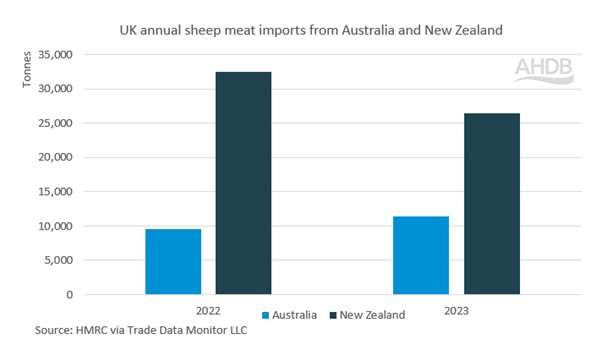Sheep meat update: how much Southern Hemisphere lamb did we import in 2023?
Friday, 1 March 2024
Key points
- Total UK sheep meat imports fell by 11% from 2022 to 2023.
- Sheep meat imports from New Zealand fell 19% year on year in 2023.
- Imports from Australia grew, up 19% from 2022.
- Australian production for 2024 to slightly increase compared to last year.
Southern Hemisphere trade into the UK has seen an interesting 2023, as both trade deals with Australia and New Zealand commenced from the end of May. New Zealand and Australia provide the UK with the majority of its sheep meat imports. Historically, imports from New Zealand have dominated trade, but are battling a structurally declining sheep flock and changing export destinations. Australia has seen higher production levels through 2023, consequently pressuring prices and causing them to fall. This has increased their international competitiveness, coupled with the free trade agreement and a weaker-than-expected Asian demand, it has boosted imports from Australia into the UK for 2023.
Levels of imports into the UK hinge on trade with China, the Middle East, and the United States, as the main destinations for Australia and New Zealand. Events such as Chinese New Year and Ramadan drive demand for both country’s product, and if these events witness lower than expected demand then product will look for a home on the international market. Industry reports suggest that Chinese New Year orders were lower than expected due to weak economic prospects dampening desire to spend during the festival period. The United States is also an important destination, with export volumes in recent months at record highs for the November to January period, as consumption levels remain stable despite continuing economic pressures.
UK annual sheep meat imports from Australia and New Zealand

Source: HMRC via Trade Data Monitor LLC
New Zealand
Sheep meat imports from New Zealand have fallen for 2023, to total just under 26,500 tonnes. This is a fall of 6,000 tonnes (19%) from the total for 2022, as the market share of New Zealand imports dropped from 60% to 55% as a result. Frozen sheep legs have seen the largest drop in import volumes of any product category from 2022, with a fall of 3,050 tonnes to 14,150 tonnes for 2023. Fresh/chilled sheep legs were the only category to see growth, of nearly 850 tonnes from 2022 to 2023, to total 13% of sheep meat imports.
Production in New Zealand has started off the year slightly higher than 2023, with hotter weeks in early February contributing to some drought-related destocking in both islands. There are some similar concerns on the number of lambs available for slaughter, and therefore export. Industry commentary suggests that pressures on the number of lambs available to kill in recent weeks has provided some strength to prices, but farm margins remain lower than usual.
Australia
Imports from Australia saw growth in volumes in 2023 compared to the previous year. Sheep meat imports totalled 11,400 tonnes for 2023, an increase of 1,800 tonnes from 2022. This year-on-year increase came from increased volumes in the second half of the year, following access from the free trade agreement. Looking into the products entering from Australia, the volume of frozen sheep legs is considerably smaller than that of New Zealand, at 1,700 tonnes, which has fallen by nearly 1,500 tonnes from 2022.
Australian lamb slaughter is expected to climb slightly from its record-breaking high for 2023, especially in the first half of the year, with a higher carryover. However, production in the second half of the year looks to be lower, as the elevated slaughter numbers for last year have eaten into its production capability for 2024. One limitation to this remains Australia’s slaughter capacity, which is currently approaching its maximum levels.
Sign up for regular updates
You can subscribe to receive Beef and Lamb market news straight to your inbox. Simply fill in your contact details on our online form.
While AHDB seeks to ensure that the information contained on this webpage is accurate at the time of publication, no warranty is given in respect of the information and data provided. You are responsible for how you use the information. To the maximum extent permitted by law, AHDB accepts no liability for loss, damage or injury howsoever caused or suffered (including that caused by negligence) directly or indirectly in relation to the information or data provided in this publication.
All intellectual property rights in the information and data on this webpage belong to or are licensed by AHDB. You are authorised to use such information for your internal business purposes only and you must not provide this information to any other third parties, including further publication of the information, or for commercial gain in any way whatsoever without the prior written permission of AHDB for each third party disclosure, publication or commercial arrangement. For more information, please see our Terms of Use and Privacy Notice or contact the Director of Corporate Affairs at info@ahdb.org.uk © Agriculture and Horticulture Development Board. All rights reserved.

